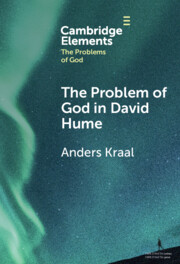Element contents
The Problem of God in David Hume
Published online by Cambridge University Press: 30 November 2023
Summary
Information
- Type
- Element
- Information
- Series: Elements in the Problems of GodOnline ISBN: 9781009270243Publisher: Cambridge University PressPrint publication: 18 January 2024
References
Accessibility standard: Unknown
Why this information is here
This section outlines the accessibility features of this content - including support for screen readers, full keyboard navigation and high-contrast display options. This may not be relevant for you.Accessibility Information
- 9
- Cited by
